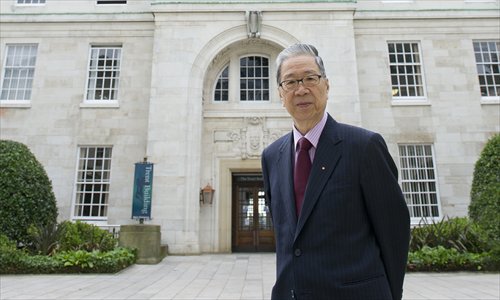HOME >> LIFE
Beyond knowledge
By Xu Ming Source:Global Times Published: 2014-4-21 21:08:03

Yang Fujia at the University of Nottingham in the UK Photo: Courtesy of UNNC
Ten years ago, when Yang Fujia decided to become president of the University of Nottingham Ningbo China (UNNC), he never expected that the school would succeed as well as it has. The first Sino-foreign collaborative university in China, when the school was established back in 2004 the idea of working with an overseas partner to establish a university was considered incredibly risky.Reflecting on the past, Yang feels rather content. "The school has reached the point that we had always hoped and worked towards," Yang told the Global Times before UNNC's 10-year anniversary press conference that was held on Thursday.
Due to UNNC's success, which he regards as a trial run for the long-term reform of Chinese universities, Yang has become confident in his ability as an educator. "It's no use writing theoretical articles, people are only convinced by reality," he noted.
Birth of Nottingham Ningbo
Born in 1936 in Shanghai, Yang graduated from Fudan University with a degree in Physics in 1958, he was later selected to join the Chinese Academy of Sciences in 1991. Starting from 1993, he served as the president of Fudan University for six years, before becoming the chancellor of England's University of Nottingham in 2001; making him the first Chinese to take command of this prestigious university.
His experiences as chancellor at Nottingham allowed him plenty of opportunities to come in contact with top universities around the world, including Yale, Harvard and Princeton just to name a few. As time went on, he began to feel obliged to introduce the educational principles of these world-class universities to China.
Based in Ningbo, Zhejiang Province, UNNC is the first collaborative university in China to completely adopt a foreign curriculum and educational system. The school uses the same education model as The University of Nottingham, with the same standards of enrollment for students and evaluation methods of teachers, and granting the same degrees.
UNNC is also the first university in China to use English as the medium for all classroom instruction and to popularize a teaching method where students are given time to think and discuss topics in class, instead of just sitting and listening to lectures from teachers. "There's no question that you can not ask, and no answer that you can not argue with," Yang said.
Meanwhile, the university boasts a great number of overseas exchange projects, lectures from international scholars and a variety of clubs to broaden students' vision.
"The best way to evaluate a university is through its students. Graduates of UNNC are full of confidence and have global vision, just as we aimed for 10 years ago," he told the Global Times.
As of 2014, UNNC has produced over six batches of bachelor degree students. Of these about 70 percent have gone on to universities like Oxford, Cambridge and Stanford to further their education, while most of the other 25 percent work in global top 500 companies.
The university met difficulties when enrolling students during its first year. Now, however, after being recognized and accepted by society, the number of enrolled students has grown from a measly 254 to 6,000 students from 70 countries and regions.
Human first, then knowledge
Behind Yang's efforts at UNNC is his ambition to spread the concept of liberal arts education in China. "UNNC basically follows the philosophy behind a liberal arts education," he told the Global Times.
Differing from professional or vocational education, liberal arts education aims to imbue students with broad knowledge and develop intellectual ability, stressing the comprehensive qualities that make an educated person.
What UNNC has achieved under his leadership in the past 10 years has further solidified his determination to introduce this concept to domestic universities.
"It's different from general education. As I understand it, there are five points that make up a liberal arts education. First, a student needs to master general knowledge, which is the basis for deeper professional education. Second, learning to be a good person comes before learning facts. Human beings first, professionals second. Third, the school should be student-centered, making the education of students a priority," Yang said.
Yang explained that the fourth point involves encouraging critical thinking and debate, therefore keeping the number of students in a class low is of upmost importance. While the fifth involves providing various clubs and social activities, as these can act as a second classroom for students.
He noted that domestic universities in China don't really pay attention to keeping the number of students in a classroom low. "I wrote numerous articles before 2004 talking about higher education, but they had little effect," Yang said, adding, "you have to show them the reality of what you can accomplish."
The staff at UNNC told the Global Times that the university had held a seminar just this past weekend to discuss the role of liberal arts education in China, and that many top domestic universities like Peking University and Fudan University joined the discussion.
Teachers at domestic universities are plagued with publishing papers, which is one of the means by which they receive promotions. But for Yang, one important standard to judge a top university is to see "whether they put the student at the center and whether students feel that 'this school changed my life' after graduation," Yang explained, adding that he receives a lot of letters from former students who wrote to express just this feeling.
"It will take time for domestic universities to reach this point, but the situation will gradually change," said Yang. "Ten years ago, China was only open enough to build one experimental Sino-foreign university. Now that it's opened fully many others have followed suit."
Posted in: Miscellany